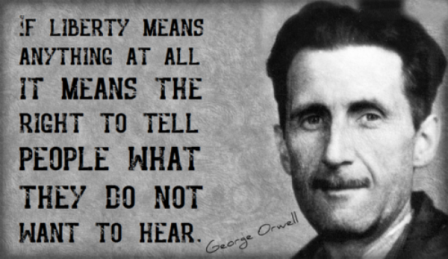I had a very interesting conversation with someone on Twitter the other week about freedom of speech. I stated that what the United Kingdom needs is the equivalent of the American First Amendment to the Constitution. My interlocutor, whose name escapes me at this point but whom I’d like to thank for making me think about this issue, brought up a very valid point which is how can something like the First Amendment be shoehorned into an unwritten constitution? They are right in a way, the First Amendment is something that is intimately connected with the Constitution of the United States and could not be transplanted wholesale into British culture and British law.
For one thing there would be a clash between the UK system and the statement in the First Amendment that ‘there shall be no established religion’. Britain does have an established church in the form of the Church of England and although I’m not a Christian myself, I recognise that the Anglican Church doesn’t only serve its members and communicants, but also provides the nation with a moderate spiritual focus when it is required. I’ve no wish to remove the Anglican church from this position as an established church, partly for this reason and partly because I see the Church of England as a bulwark against more extreme Christian religious positions. For historical and cultural reasons, for many years the C of E has been a reasonably successful compromise between theological strictness and theological liberalism and that I believe is a good thing. I’ve no vehement objections to the current system in this regard and therefore I consider myself to be that rare beast, a non-Christian supporter of antidisestablishmentarianism.
The prohibition on established religion aside, that doesn’t mean that other provisions in the First Amendment could not be transplanted to the UK (or returned to the UK depending on your point of view). Although I’m no British constitutional lawyer, I can see how parts of existing legislation, such as the 1689 Bill of Rights, could be taken as a blueprint for a ‘British first amendment’. Specifically I have in mind the provision in the 1689 Bill of Rights guaranteeing members of the Commons and members of the Lords freedom of speech, could be extended to all of us. It’s right that those representing us and governing us should have the right to speak freely without fear of hassle from the Monarch, but it is now time for that freedom to be granted to all.
Of course the extension of the rights of Parliamentarians to all of us cannot be merely accomplished by beefing up the 1689 rights alone, other legislation will need to be either repealed or amended. There will also need to be some legal restriction on those who issue credible threats to kill. I think that many will recognise that making a credible threat to take someone’s life is so serious that it deserves to remain illegal.
However other speech restrictions that fall short of that line in the sand should go. The sections of the Public Order Acts that deal with ‘incitement to racial hatred’ need to go, not because I agree with or condone inciting hatred of people of different races, I don’t, but because these provisions can be abused or applied inequitably to different people. For example it’s rare that a Muslim hate preacher gets arrested, charged and convicted for inciting hatred against Jews or gays or Christians but it’s easy to get nicked for inciting dislike for Islam. The 2006 Racial and Religion Hatred Act, and the more politically correct clauses of other acts governing things like homophobia and transphobia also need to be consigned to the dustbin of history for similar reasons of inequitable application or inequitable outcome. We need the right to speak freely even if people find what some of us have to say as ‘offensive’.
We have the situation in the UK at present where we can criticise Christianity, including by the use of some of the most profane mockery available, but we can’t do the same to Islam. In fact do this and as some have recently discovered, it is likely to end up with the ‘hate speech offender’ being put in a prison cell. It’s complete madness that some ideas are protected and coddled and some are not. Another example is this: I have Transgender friends but if I stood up on a stage and said what I believe, which is that maybe gender transitioning isn’t the best way to go with the majority of those with gender identity issues, then I can be accused of ‘hate speech’. It is even possible that I could be arrested for behaviour likely to cause a breach of the peace because Trans activists would most likely kick off violently at the public expression of this opinion. We should all be equal before the law and where we are not equal, there should be a damn good national security reason for such an exception.
Nearly all of the ‘hate speech’ and ‘hate crime’ legislation needs to either go, or be significantly amended. This is because so many of these laws rely on the subjective perception of the incident by the individual alleged victim. Because of that it makes me uneasy that courts are relying on something as subjective as individual perception to drag people through the courts and possibly deprive them of their liberty. Again with ‘hate speech’ and ‘hate crime’ laws there is also the possibility of these laws being abused by those falsely alleging ‘hate speech’ or ‘hate crime’ for reasons of personal gain, or to settle scores with individuals who may hold different opinions from the person alleging they’ve been the subject of a speech related ‘hate crime’.
Many of the ‘hate crime’ and ‘hate speech’ related laws were brought in by people often of good intent who observed what they saw as injustices and formulated laws to stop these injustices. Unfortunately they have not worked out as well as they may have planned, in fact what has resulted is a bit of a dogs breakfast. Instead of a clear and concise statement of freedom of speech, with few justifiable exceptions, what we have got have instead is a confusing mess where Her Majesty’s subjects do not know what opinions that they may hold or express are legal and which are illegal and could get them banged up in prison. I can see both sides of the ‘hate speech’ argument in that I have been both protected by ‘hate speech’ law and also oppressed by it. Although I like being protected, I don’t think that my individual protection under the law is worth the damage that hate speech law does to the rights of others.
There are a wealth of nasty, ghastly, disgusting, horrible opinions out there I admit that. Every day on social media I see stuff that turns my stomach. I see calls for genocide, I see Holocaust denial, I see misogyny and some vile stuff aimed at gays and lesbians. I hate and I wish that such stuff didn’t exist but it does and it needs to be challenge via peaceful open discussion. Morally this stuff is wrong and for me beyond the pale, but I’m becoming increasingly convinced that the answer to such vile opinions is not to ban them, but to leave them in the open where they can be challenged. Basically, I want my enemies visible so that I can marshal arguments against then and if necessary give them a verbal and factual kicking.
As better people than I have said: The answer to hate speech is not speech restrictions, but more free speech. Let’s get bad ideas out in the open where they can be given a damn good thrashing. Of course publishers, whether those who publish online or in print, should be free to exercise editorial control over their publications, and not publish stuff that goes against their own editorial guidelines. For example: I have editorial control over this blog and there is stuff that I don’t allow to be published for a variety of reasons. That’s my inalienable right. To do otherwise is an attack on property rights. However, I wonder whether the blunt instrument of the law should have any place in the editorial decisions taken by individual publications? A newspaper, to give but one instance, should not be using weasel words like ‘Asian’ to describe rape gangs that are predominantly made up of Muslims merely to avoid coming into conflict with laws that prevent ‘Islamophobia’. The law and fear of the law has become a suffocating parasite on a nation that once prided itself on the high degree of freedom of speech that the subject enjoyed.
I don’t have all the answers to our current problems regarding the lack of freedom of speech in the UK and I doubt very much that any one individual does. However, I’m confident that by extending existing and sometimes ancient laws to cover all the people and amending or repealing those laws that are restricting the right of the subject to speak, Britain can make a start on bringing freedom back.
If Britain dumped many of the ‘hate speech’ and ‘hate crime’ laws that have has such a baleful effect on the subject’s individual rights to speak freely about the matters that concern them then we would become free to challenge bad ideas and promote good ideas. A Britain where free speech was something that the individual considered as inalienable, as it is in the United States, would not only be a more relaxed place, but would be one which would be a temple for the only form of diversity that really matters and that is the diversity of opinion.
To conclude: I agree with the person who sparked my interest in writing this piece in that it is difficult if not impossible to lift the American First Amendment wholesale and dump it on a country that doesn’t even have a formalised written constitution. But that doesn’t mean that Britain should not look to the First Amendment for inspiration when it comes to reforming, repealing and creating law that guarantees the right of the subject to give voice to their conscience and give voice to their opinion.
Links
1689 Bill of Rights
http://www.legislation.gov.uk/aep/WillandMarSess2/1/2/introduction
Racial and Religious Hatred Act 2006
http://www.legislation.gov.uk/ukpga/2006/1/pdfs/ukpga_20060001_en.pdf
Public Order Act 1986
http://www.legislation.gov.uk/ukpga/1986/64/pdfs/ukpga_19860064_en.pdf
Transgenderism a difficult thing to freely criticise
https://www.theguardian.com/commentisfree/2012/may/29/transgenderism-hate-speech





